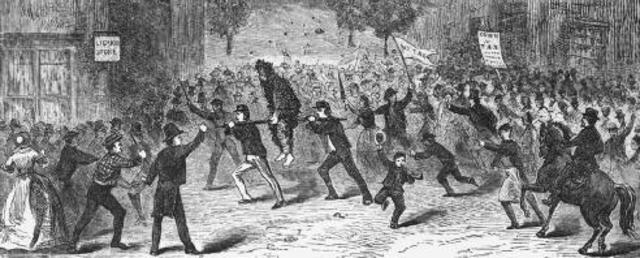

It was as controversial as it was because it was the first time the newly-formed US government imposed a tax on a domestic good. The tax that had everyone up in arms was known as “The Whiskey Tax,” and it was charged to producers based on how much whiskey they made. The law required citizens to register their stills and pay a tax to a federal commissioner within their region.

This legislation, pushed through Congress by Secretary of Treasury Alexander Hamilton (1755-1804), was designed to help pay off state debts assumed by Congress in 1790. More precisely, The Whiskey Rebellion developed after the First United States Congress, seated at Congress Hall at Sixth and Chestnut Streets in Philadelphia, passed an excise tax on domestic whiskey on March 3, 1791. It took place in Western Pennsylvania, near Pittsburgh, between 17. The Whiskey Rebellion was an armed insurrection against a tax imposed by the federal government on distilled spirits, which, in 18th century America, basically meant whiskey. What started as a tax in 1791 led to the Western Insurrection, or better known as the Whiskey Rebellion of 1794, when protesters used violence and intimidation to prevent federal officials from collecting. It is the morning of Augand the Whiskey Rebellion is underway. You blink the gathering sweat out of your eyes, swatting at a handful of encroaching mosquitoes, and strain to see the faces of the soldiers waiting. You’d piled and stacked plenty yourself, your hands shaking, your mind numb with adrenaline and fear, praying all the while this idea would work. You can see the boxes, the sacks, the barrels, wobbling in the back of the cart a king’s bounty of salted meats, beer, wine… barrels and barrels of whiskey. The plea for peace - scrambled together by desperate residents who wished blood not be shed - is now climbing its way towards the rebel leaders, where they wait across the river. A crowd of angry men awaits to slaughter all you hold dear. But many of your wealthier, Eastern neighbors do not. In plenty of ways, you sympathize with them. They feel betrayed by the government they fought to create and now choose to confront the authority they’ve been told to answer to. Many members of the angry mob are veterans of the Revolution. If this plan fails, they will no longer only threaten violence. The rebels it passes through, who have swarmed at the edges of town over the previous few days, threatening violence, are regular people just like you - when they don’t face oppression and restrictions on their freedom. The wagon you and your neighbors loaded is click-clacking up the hill. Your view of town - which, in the next few years, will be incorporated as the city of Pittsburgh - is barren streets and quiet docks.

Standing where the slow slope of your eight-acre farm meets the Allegheny River, your eyes pass over the buildings your neighbors call home, searching. Near the banks of the river, mosquitoes swarm, flying about your head, threatening to plunge into your skin.


 0 kommentar(er)
0 kommentar(er)
